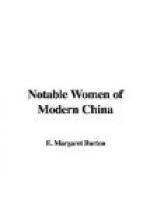“Talk of missionary work! People at home don’t know the meaning of the word! Here is this plucky little woman in the midst of this awful heat—I dare not go outside of a shaded room until after the sun is down at night—treating anywhere from twenty to fifty patients in the dispensary every day, and her charity ward filled with the most trying, difficult, repulsive cases of suffering humanity. Missionary work? Why you don’t even find such cases as she has every day, in the hospitals of America. How the people live as long as they do—how these poor little suffering children survive until they get to the state they are in when brought to the hospital, is more than I can understand.”
Dr. Edward C. Perkins, who visited Dr. Stone for several days, lays similar emphasis on the serious condition in which the doctor finds those who apply to her for treatment. “The cases which came to the dispensary were sorely in need of help. This was, I think, the invariable rule. Such cases they were as do not often come to the observance of physicians in this country, and some familiarity with the dispensaries of four of the large hospitals in New York City, has almost failed to show such need as the little doctor sees continually.”
No physician in China can be a specialist. One of Dr. Stone’s letters shows the variety of diseases which she is called upon to treat. “Women come to us almost dead; paralyzed, blind, and helpless.... We have in the isolation wards, measles; and in the contagious rooms, locked up, leprosy; an insane woman locked up in her room; typhoid, tuberculosis, paralyzed women and children, ulcer cases such as you would never dream of, surgical cases of all kinds, and internal cases too numerous to mention.”
A letter from a Kiukiang missionary tells of one woman who came to the hospital with “not a square inch of good flesh on her entire body.” Fingers and toes were so diseased as to be dropping off, and the poor woman’s suffering was unspeakable. Dr. Stone put her in isolation, and taking every precaution with gloves and antiseptics, herself washed and dressed the repulsive sores, in spite of the sufferer’s protests, “Oh, doctor, don’t touch me. I am too filthy for your pure hands to touch.” This she did every day, until, her sores completely healed, the woman was discharged from the hospital a few weeks later.
Hon. Charles M. Dow of Jamestown, N.Y., who was taking a trip around the world, met Bishop Lewis on a Yangtse-kiang steamer, and was invited by him to stop off at Kiukiang to make the acquaintance of a remarkable surgeon of that city. Great was Mr. Dow’s astonishment when the surgeon appeared and proved to be “a small and very attractive native Chinese woman.”




